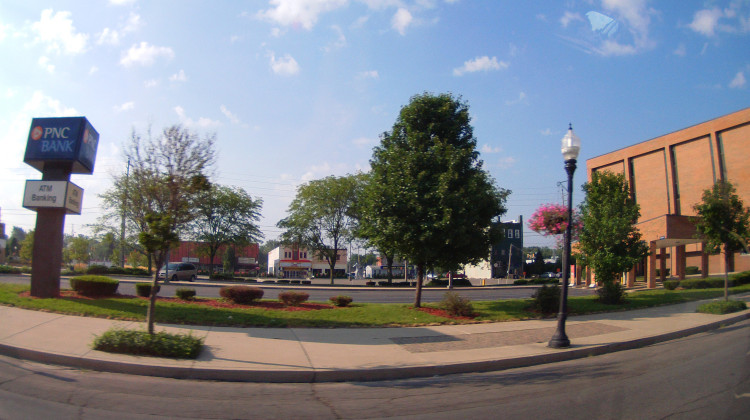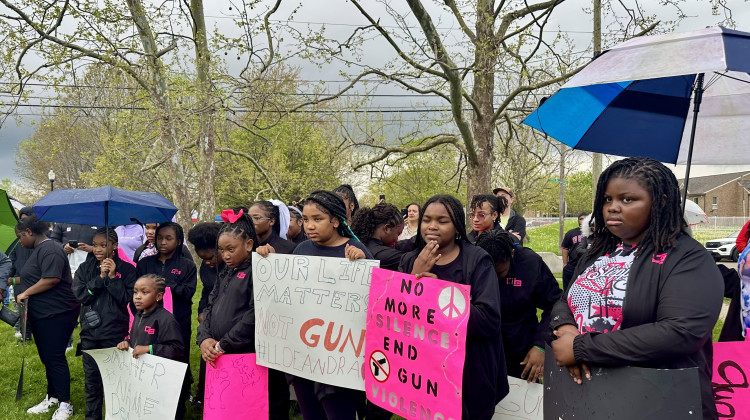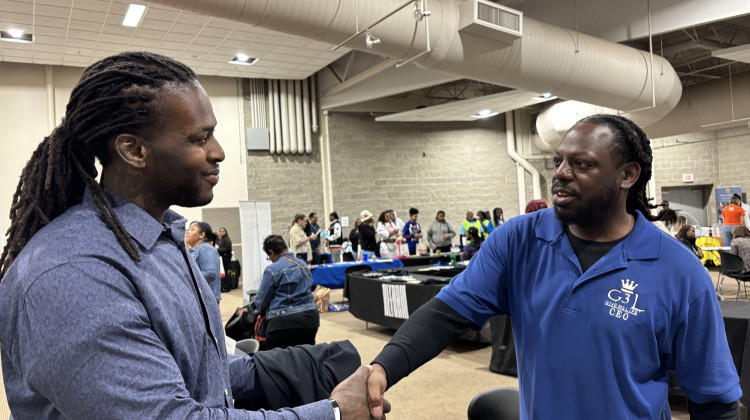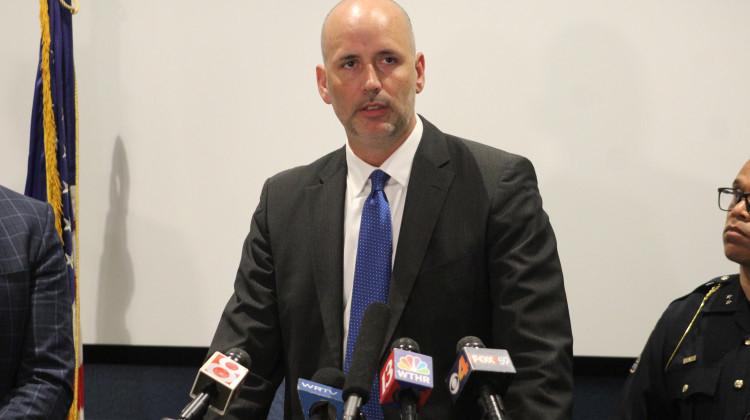
Logansport is one of the communities with organizations being targeted by Attorney General Todd Rokita.
Evan Nichols / Wikimedia CommonsA charity. A school corporation. A public health department. An economic development group. A private business. A national refugee workforce nonprofit.
These six entities across three Indiana cities were targeted by the Indiana Attorney General’s Office for an investigation into “coordinated efforts … to bring large numbers of migrants to Indiana communities,” according to an office press release.
But the reasons why these groups — from Evansville, Logansport and Seymour — were included is less clear.
Five of the six organizations didn’t respond to inquiries from the Indiana Capital Chronicle and just one — the Jackson County Industrial Development Corp. — officially said it had no comment.
All three areas have experienced documented surges in their local immigrant populations in recent years, straining local resources. The success of President-elect Donald Trump, who has frequently espoused anti-immigrant views, on Election Night appeared to signal support for such policies.
How did we get here?
Immigration has long played a role in American politics — especially during times of perceived economic distress — with both parties pushing for deportation-friendly policies, said Vanessa Cruz Nichols, an assistant professor at Indiana University with a focus on immigration and politics.
“It’s not a new issue,” summarized Cruz Nichols. “… but there are a lot of researchers I’ve looked at trying to understand public attitudes toward immigration and to what extent are economic downturns linked with more anti-immigrant attitudes.”
Democratic nominee and Vice President Kamala Harris supported stricter border control. Former President Barack Obama was nicknamed “Deporter in Chief.”
But Trump has vowed to implement the “largest deportation in U.S. history, a promise that could cost the nation tens of billions of dollars.
Between 2022 and 2023, an additional 1.6 million immigrants called America home, the largest annual increase in more than 20 years, according to data from Pew Research Center. Altogether, the United States is home to an estimated 47.8 million immigrants, roughly 14.3% of the population. Pew estimates that 77% of immigrants are in the country legally, leaving 23% who are unauthorized.
Cruz Nichols said such anti-immigrant themes have been apparent for centuries, whether the sentiment was anti-Mexican, anti-German, anti-Chinese or anti-Irish.
“Scapegoating immigrants has been a tried and true method to mobilize voters. When a candidate is trying to seek blame for an economic downturn, it’s easy to try to turn to foreigners or non-Americans,” Cruz Nichols said. “Again, people have looked at this and there’s very little evidence that strongly correlates to one’s actual, personal economic circumstances with their immigrant attitudes.
“It’s more of this perception of competition, perception of cultural impacts that tends to better explain people’s anti-immigrant attitudes.”
Recently, Logansport attracted national attention following an influx of Haitian migrants with temporary protected status. Changes to federal asylum policy means that other migrants crossing the southern border live in a sort of legal limbo, making them one of the roughly 3.5 million pending cases in immigrant courts.
Both groups can be legally authorized to work and receive certain assistance — making their presence more visible to native-born Americans.
Migrants can have a buoying effect on economies, filling key positions in agricultural or health care sectors and paying millions into the Social Security system without reaping the benefits. Ball State economist Mike Hicks even argued that “Immigration is the only hope for (the) state’s dying small towns,” saying that an influx of migrants would boost dwindling populations in rural areas.
But not everyone is convinced.
Concerns at the local level
The small city of Seymour in Jackson County has experienced a 174% increase in its Latino and Hispanic population between 2010 and 2020, according to a report from the Brookings Institution that established recommendations and an “agenda” for advancing rural economies.
“While this growth has provided many workforce and economic development opportunities for the small city, it has also led to increasing challenges in meeting the needs of the growing population,” according to the Brookings Institution.
The Brookings Institute engaged the support of the Indiana Economic Development Corp. for the analysis, which also included Michigan City and Warsaw.
But the proposal to build an immigrant welcome center sparked community backlash, prompting the Seymour City Council to pull support for the report. Its release, “woke some people up,” to Seymour’s migrant population, according to Seymour Rep. Jim Lucas.
“I’ve had teachers reach out to me, elementary teachers, who will have 28 kids in a class and 20 of them are (English Learners),” said Lucas, a Republican. “And then seven of them were level ones who speak zero English … and you can just see the challenges that our teachers are facing day to day.”
Additionally, Lucas said the officers with the Seymour Police Department reported encountering more drivers operating vehicles without licenses. Legislation to allow undocumented migrants to obtain licenses has repeatedly stalled at the Statehouse.
Supporters for such a measure have said that having everyone on the roads licensed would improve public safety all around, especially since much of Indiana lacks transit options.
In response to a local car accident with an unlicensed and undocumented migrant in which another driver died, Lucas said he was working with the Attorney General’s Office to file two pieces of legislation.
The first would compel at-fault drivers to pay the deductible of other drivers and another would penalize unlicensed drivers by towing their vehicles and hitting them with a misdemeanor. After the first offense, the penalty for the latter could bump up to a felony, he said.
“I love this town and I see what it’s turning into and there are a lot of very, very nice immigrants. And I’ve said this publicly … ‘If people want to come here legally and live here and raise their family and assimilate into our culture — one family (in) one house, pay taxes, keep your money here locally, (and) start a business — we welcome those people with open arms,’” Lucas said.
“But, for the people who are just coming here to plunder our resources for a job only to move on? We’d just as soon you’d go somewhere else,” he continued.
"Our community sees this as an opportunity"
Newly elected Evansville Rep. Alex Burton, a Democrat, has a different perspective on immigration, pointing to unfilled jobs and other economic gains. A former Evansville City Council member, Burton played a role in launching Evansville’s “bipartisan” Immigrant Welcome and Resource Center.
“Haitian, Marshallese and Hispanics are three demographics that are choosing to move to Evansville and our community sees this as an opportunity,” Burton said. “There are tons of jobs available — whether we’re talking manufacturing, health care and other avenues — where we want to get more persons to employment.”
Burton works for one of the companies subject to the Attorney General’s inquiry, Berry Global, which he dubbed “the biggest company you know nothing about.” The company manufactures plastic goods like the cups at fast food restaurants, yogurt containers and even packing tape.

Burton spoke to the Indiana Capital Chronicle as an incoming legislator and not on behalf of the company.
However, Burton’s role as a workforce development manager may relate to that inquiry, since he oversees efforts like Berry Global’s Refugee Integration Hiring Program.
Both Rokita and Lucas pointed to housing issues following an influx of migrants, often in communities where housing is already in short supply. Burton acknowledged that resource bottleneck, saying it was one of the reasons why he wanted to join the General Assembly.
“Whether you’re an immigrant or your family’s been in Evansville for generations, housing is a huge issue,” Burton said. “I see (housing) as number one — it doesn’t matter what language you speak or where you come from, everyone deserves that opportunity. Right now, that is not a fact for everyone who is currently living in Indiana.”
Burton said that Evansville wasn’t attracting other Hoosiers to supplement its population but that first-generation migrants were coming to the area to make the state’s third-largest city home.
“We have to fill those (jobs). It’s no different than the industrial age of years ago — when folks first came to the United States, they were working in the factory,” Burton said. “We need to make sure that we get people — who are obviously, yes, legal — but we need to get people in through our doors.”
Evansville, he said, could be a model for other cities to follow and “embrace” migrants in their communities. Such challenges might include locating interpreters for local health systems when non-English speakers access emergency services.
“Instead of saying, ‘We can’t handle anymore people coming in, this is all too much,’ I was part of a group that came together and said, ‘No, we’re not going to come in with a defeatist mindset. We’ve going to be proactive about this, we’re going to get the right people at the table and we’re going to figure out how to solve it,’” Burton said.
Reaction to the Attorney General’s investigation
When asked if he knew why the Attorney General’s Office had targeted the Jackson County Industrial Development Corporation in its investigation, Seymour’s Lucas said, “I think they’ve done too good a job.”
“They’ve overwhelmed the local area’s ability to provide adequate jobs,” Lucas said. “… JCIDC should welcome this audit, because if nothing’s going on then they’ll have an audit from the Attorney General’s Office saying that.
If Rokita hadn’t pursued such an investigation, Lucas said he would “probably be neglecting his duties.”
But to Cruz Nichols, the inquiry had a more “chilling effect.”
“I was immediately concerned,” Cruz Nichols said.
She shared her prior research on the negative impact of enhanced surveillance on Latino and Hispanic health and well-being, noting that Indiana wasn’t immune to such efforts.
“I’ve found that people are essentially more reticent and more cautious when they hear about safe spaces being targets for potential raids,” Cruz Nichols said. “That chilling effect is important for both the targeted immigrant community, but also for their children — who are U.S.-born children or who have more protections than their parents.”
A post-election story from Chalkbeat shared dozens of classroom reactions to Trump’s election, including a 13-year-old in Indianapolis who feared that her family would be deported. Cruz Nichols said that parents at an East Chicago school were stopped while dropping their children off at school and arrested if they didn’t have a license, triggering a spike in absenteeism as families were afraid to go out into the community.
“It’s not good for the overall health of a community when you’re seeing increased surveillance that is not targeted … (with) very loose discretion being applied to where people are being questioned about their immigration status,” Cruz Nichols said.
Burton said he saw an eventual meeting with Rokita as an “opportunity.”
“I’m looking forward to having an actual conversation with the Attorney General,” Burton told the Indiana Capital Chronicle. “… to not only share my perspective on what the opportunity is for our economy, but also really share that the manufacturers and agencies that are operating in southwest Indiana are doing so from a place of ethical principles.”
“We know that immigration is an issue, but we also know that we have workforce challenges and we need to find those solutions,” Burton continued. “Because our manufacturing across the state needs to get the product out the door so they can stay in business. But then, also, the Indiana economy can truly thrive.”
Indiana Capital Chronicle is part of States Newsroom, a nonprofit news network supported by grants and a coalition of donors as a 501c(3) public charity. Indiana Capital Chronicle maintains editorial independence. Contact Editor Niki Kelly for questions: info@indianacapitalchronicle.com. Follow Indiana Capital Chronicle on Facebook and X.
 DONATE
DONATE








 Support WFYI. We can't do it without you.
Support WFYI. We can't do it without you.